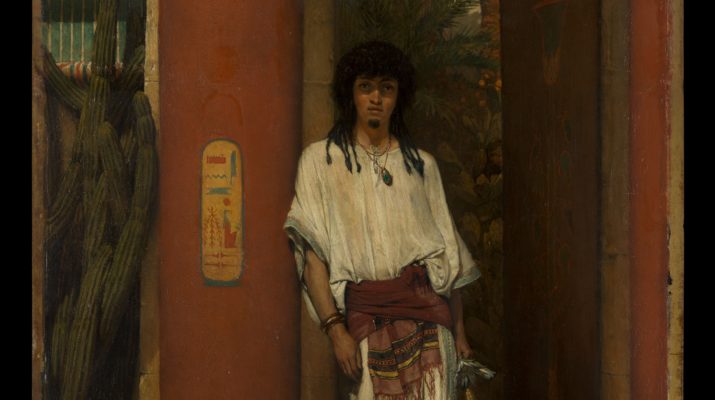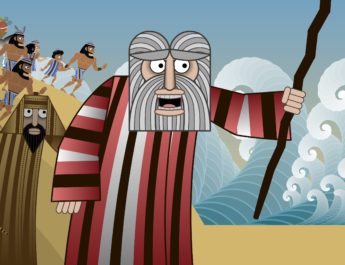Exodus 1
1 These are the namesI of the sonsII of IsraelIII
I “names” = shem. May be from sum (to put, place, set). This is name, fame, renown. A name was thought to indicate something essential about a person – something about their individuality. So, this word can also mean honor, authority, or character.
II “sons” = ben. From banah (to build or obtain children). This is son, age, child. It is son in a literal or figurative sense.
III “Israel” = Yisrael. From sarah (to persist, exert oneself, contend, persevere, wrestle, prevail) + el (God or god). This is Israel, meaning God strives or one who strives with God; new name for Jacob and for his offspring. This refers to the people and to the land.
who cameIV to EgyptV with Jacob,VI eachVII with his household:VIII
IV “came” = bo. This is to enter, come in, advance, fulfill, bring offerings, enter to worship, attack. It can also have a sexual connotation.
V “Egypt” = Mitsrayim. Perhaps from matsor (besieged or fortified place, bulwark, entrenchment; something hemmed in; a siege or distress or fastness); from tsur (to confine, besiege, to cramp). This is Egypt.
VI “Jacob” = Yaaqob. From the same as aqeb (heel, hind part, hoof, rear guard of an army, one who lies in wait, usurper). This is Isaac’s son and his descendants. The name means heel-catcher or supplanter.
VII “each” = ish. Perhaps from enosh (human, humankind, mortal); from anash (to be weak, sick, or frail). This is man, husband, another, or humankind.
VIII “household” = bayit. Related to “sons” in v1. Probably from banah (see note II above). This is house, court, family, palace, temple.
2 Reuben,IX Simeon,X Levi,XI and Judah,XII
IX “Reuben” = Reuben. Related to “sons” and “household” in v1. From raah (to see, show, stare, think, view; to see in a literal or figurative sense) + ben (see note II above). This is Reuben, meaning “behold a son.”
X “Simeon” = Shimon. From shama (to hear, often implying attention and obedience). This is Simeon, Symeon, or Simon. It is a personal name as well as the tribe Simeon. It means “he who hears.”
XI “Levi” = Levi. Perhaps from lavah (to join, twine, unite, remain, borrow, lend). This is Levi, perhaps meaning “attached.” It can refer to Jacob’s son, his tribe, and descendants.
XII “Judah” = Yehudah. Probably from yadah (to throw one’s hands into the air in a gesture of praise); from yad (hand). This is Judah, meaning “praised.”
3 Issachar,XIII Zebulun,XIV and Benjamin,XV
XIII “Issachar” = Yissaskar. Related to “each” in v1. Perhaps from nasa (to lift in a broad sense, literally and figuratively; to carry, take, or arise; to bring forth, advance, accept) + sakar (wages, payment, service, salary, worth, reward, or benefit); {from sakar (to hire, reward, earn)} OR ish (see note VII above) + sakar (see above). This is Issachar, one of Jacob’s children and his tribe. It may mean “there is recompense,” “man of hire,” “he is wages,” or “he will bring a reward.” See https://www.abarim-publications.com/Meaning/Issachar.html
XIV “Zebulun” = Zebulun. From zabal (to dwell, inclose, reside). This is Zebulun, that tribe, or their territory. It means “habitation.”
XV “Benjamin” = Binyamin. Related to “sons” and “household” in v1 & “Reuben” in v2. From ben (seen note II above) + from yamin (right hand or side; that which is stronger or more agile; the south); {perhaps yamam (to go or choose the right, use the right hand; to be physically fit or firm)}. This is Benjamin, meaning “son of the right hand.” It could refer to Benjamin himself, his offspring, their tribe, or their territory.
4 DanXVI and Naphtali,XVII GadXVIII and Asher.XIX
XVI “Dan” = Dan. From din (to judge, defend, dispute, govern, quarrel, plead). This is Dan or a Danite. It means “judge” and can refer to Dan, his tribe, or the lands of the tribe.
XVII “Naphtali” = Naphtali. From pathal (to twist, twine, wrestle, struggle, behave in an unsavory way). This is Naphtali, meaning “my wrestling.” It can refer to Naphtali, his tribe, or the lands of the tribe.
XVIII “Gad” = Gad. Perhaps from gad (fortune, troop; Gad, the name of a god of Babylon); from gad (fortunate, a troop); from gud (to invade, overcome, attack). This is Gad, one of Jacob’s children, his tribe and the land they settled. It means “fortune” or ”fortunate.”
XIX “Asher” = Asher. From ashar (to go straight, lead, guide; to be level and so to be right, blessed, honest, happy). This is Asher, one of Jacob’s children and his tribe. It means “happy one.”
5 The totalXX number of peopleXXI bornXXII to Jacob wasXXIII seventy.XXIV, XXV JosephXXVI was already in Egypt.
XX “total” = kol. This is all or every.
XXI “people” = nephesh. Related to naphash (to refresh or be refreshed). This is soul, self, person, emotion. It is a breathing creature. Can also refer to appetites and desires.
XXII “born” = yatsa + yarek. Literally, “went out from his loins.” Yatsa is to go or come out, bring forth, appear. It is to go out in a literal or figurative sense. Yarek has a root that may mean to be soft. This is thigh, side, body, shank. It can be used figuratively for genitalia.
XXIII “was” = hayah. This is to be or become, to happen.
XXIV “seventy” = shibim. From sheba (seven – the number of perfection/sacred fullness). This is seventy.
XXV {untranslated} = nephesh. Same as “people” in v5. See note XXI above.
XXVI “Joseph” = Yoseph. From yasaph (to add, increase, continue, exceed). This is Joseph, meaning “he increases” or “let him add.”
6 Then Joseph died,XXVII and allXXVIII his brothers,XXIX and that wholeXXX generation.XXXI 7 But the IsraelitesXXXII were fruitfulXXXIII and prolific;XXXIV
XXVII “died” = mut. This is to die in a literal or figurative sense. It can also refer to being a dead body.
XXVIII “all” = kol. Same as “total” in v5. See note XX above.
XXIX “brothers” = ach. This is brother, kindred, another, other, like. It is literally brother, but it can also be someone who is similar, resembling, or related to.
XXX “whole” = kol. Same as “total” in v5. See note XX above.
XXXI “generation” = dor. From dur (to move in a circle, which implies living somewhere or remaining there; it can also be the sense of piling or heaping up). This is a revolution of time, which is to say, an age or generation. It can also be a dwelling or one’s posterity.
XXXII “Israelites” = ben + Yisrael. Literally “children of Israel.” Ben is the same as “sons” in v1. See note II above. Yisrael is the same as “Israel” in v1. See note III above.
XXXIII “were fruitful” = parah. This is to bear fruit, grow, be fruitful, increase. It is bearing fruit in a literal or figurative sense.
XXXIV “prolific” = sharats. 14x in OT. This is to swarm, creep, abound, breed a lot, wriggle.
they multipliedXXXV and grewXXXVI exceedingly strong,XXXVII so that the landXXXVIII was filledXXXIX with them.
XXXV “multiplied” = rabah. This is increasing in any aspect whether quantity, authority, size, quality, greatness, etc.
XXXVI “grew” = atsam. This is vast, numerous, strong. It can be to close one’s eyes, to make powerful, or to break bones.
XXXVII “exceedingly strong” = meod + meod. Perhaps from the same as uwd (firebrand, a poker). This is very, greatly, exceedingly. It can also mean vehemence, force, abundance.
XXXVIII “land” = erets. Root may mean to be firm. This is earth, ground, field land, or country.
XXXIX “filled” = male. This is fill, satisfy, replenish, accomplish, fulfill, confirm, or consecrate. It is fill in a literal or figurative sense.
8 Now a newXL kingXLI aroseXLII over Egypt, who did not knowXLIII Joseph.
XL “new” = chadash. From chadash (to renew or restore, to repair or rebuild). This is something fresh or new.
XLI “king” = melek. From malak (to be or become king or queen, to rise to the throne, to be crowned; by implication, to take counsel). This is king or royal.
XLII “arose” = qum. To arise, stand, accomplish, establish, abide. This is rising as in rising against, getting up after being sick or asleep, arising from one state to another, becoming powerful, or rising for action. It can also be standing in a figurative sense.
XLIII “know” = yada. This is to know, acknowledge, advise, answer, be aware, be acquainted with. Properly, this is to figure something out by seeing. It includes ideas of observation, recognition, and care about something. It can be used causatively for instruction, designation, and punishment.
9 He said to his people,XLIV “Look,XLV the Israelite people are more numerousXLVI and more powerfulXLVII than we. 10 Come,XLVIII let us deal shrewdlyXLIX with them, orL they will increaseLI
XLIV “people” = am. From amam (to darken, hide, associate; creating shadows by huddling together). This is people or nation. It can be used specifically for a tribe, collectively of troops or armies, or figuratively to refer to a flock of animals.
XLV “look” = hinneh. From hen (lo! Behold! If, though; an expression of surprise). This is to draw attention, show suddenness or surprise, or to emphasize the importance of the coming statement. See! Lo! Behold!
XLVI “numerous” = rab. From rabab (increasing in any aspect whether quantity, authority, size, quality, greatness, etc.). This is abundance, many, elder, exceedingly, great. It refers to abundance of amount, rank, or status.
XLVII “powerful” = atsum. Related to “grew” in v7. From atsam (see note XXXVI above). This is mighty or mighty one. It means powerful, which implies large numbers.
XLVIII “come” = yahab. This is give, put, bring, take. It is to give in a literal or figurative sense.
XLIX “deal shrewdly” = chakam. This is to be wise or teach wisdom. It is wisdom in thought, word, or action.
L “or” = pen. Perhaps from panah (to turn, face, appear). This is lest, if, or.
LI “increase” = rabah. Same as “multiplied” in v7. See note XXXV above.
and, in the event of war,LII joinLIII our enemiesLIV and fightLV against us and escapeLVI from the land.”
LII “in the event of war” = hayah + ki + qara + milchamah. Hayah is the same as “was” in v5. See note XXIII above. Qara is to meet, befall, happen upon. It can be to encounter by chance or for aggression. Milchamah is from lacham (to eat or feed on; figuratively, to battle as a kind of consumption/destruction). This is battle, war, fighting, or one who fights (i.e. a warrior).
LIII “join” = yasaph. Related to “Joseph” in v5. See note XXVI above.
LIV “enemies” = sane. This is an enemy or foe. It is one that is hated with a personal hatred.
LV “fight” = lacham. Related to “war” in v10. See note LII above.
LVI “escape” = alah. This is to go up, approach, ascend, be high, be a priority; to arise in a literal or figurative sense.
11 Therefore they setLVII taskmastersLVIII over them to oppressLIX them with forced labor.LX
LVII “set” = sum. Related to “names” in v1. See note I above.
LVIII “taskmasters” = sar + mas. Sar is chief, leader, ruler, lord, official, governor, prince, military leader. It refers to someone at the top of a rank or class. Mas is perhaps from masas (to melt, discourage, faint; to deteriorate from a sickness or weaken because of sleepiness or an emotional response). This is a burden that creates weariness and or exhaustion. It is forced labor, taskwork, or other levy.
LIX “oppress” = anah. This is to be bowed down. It can refer to a sense of humility or to a sense of being browbeaten, oppressed, afflicted, or depressed. This can be literal or figurative – depressed in mood or circumstance.
LX “forced labor” = siblah. 6x in OT. From sabal (to carry a heavy load, do strong labor, be a burden; specially, to be pregnant). This is a burden or forced labor.
They builtLXI supplyLXII cities,LXIII PithomLXIV and Rameses,LXV for Pharaoh.LXVI
LXI “built” = banah. Related to “sons” and “household” in v1 & “Reuben” in v2 & “Benjamin” in v3. See note II above.
LXII “supply” = miskenot. 7x in OT. From sakan (being customary, of use, of acquainted with, of service). This is supply or storehouse.
LXIII “cities” = iyr. From uwr (to awaken or wake oneself up). This can mean excitement in the sense of wakefulness or city. Properly, this is a place that is guarded. Guards kept schedules according to watches. This sense of the word would include cities as well as encampments or posts that were guarded.
LXIV “Pithom” = Pitom. 1x in OT. From Late Egyptian *Pi-ʔAtōm (“house of Atum”; Atum was a sun god). This is PIthom. See https://en.wikipedia.org/wiki/Pithom
LXV “Rameses” = Raamses. 5x in OT. From Egyptian (literally “Ra is the one who bore him”). Rameses.
LXVI “Pharaoh” = Paroh. From Egyptian pr (palace, pharaoh; literally house + great). This is Pharaoh, a title for Egyptian kings. See https://en.wiktionary.org/wiki/pharaoh
12 But the more they were oppressed,LXVII the more they multiplied andLXVIII spread,LXIX so that the Egyptians came to dreadLXX, LXXI the Israelites.
LXVII {untranslated} = ken. Perhaps from kun (properly, in a perpendicular position; literally, to establish, fix, fasten, prepare; figuratively, it is certainty, to be firm, faithfulness, render sure or prosperous). This is to set upright. Generally used figuratively to mean thus, so, afterwards, rightly so.
LXVIII {untranslated} = ken. Same as {untranslated} in v12. See note LXVII above.
LXIX “spread” = parats. This is to make a breach, burst out, compel, disperse. It is to break out literally or figuratively.
LXX “dread” = quts. 9x in OT. This is to feel dread, be distressed, tired, terrorized, be disgusted, be anxious, abhor.
LXXI {untranslated} = paneh. Related to “or” in v10. From panah (see note L above). This is face in a literal or figurative sense. It could be face, presence, anger, respect. It can also be used of God to indicate divine favor or presence.
13 The EgyptiansLXXII became ruthlessLXXIII in imposing tasksLXXIV on the Israelites, 14 and made their livesLXXV bitterLXXVI with hardLXXVII serviceLXXVIII
LXXII “Egyptians” = Mitsri. Related to “Egypt” in v1. From the same as Mitsrayim (see note V above). This is Egyptian.
LXXIII “ruthless” = perek. 6x in OT. Root may mean to fracture or break apart, emphasizing the severity or the break. This is harshness, severity, cruelty. Can also be used to say rigorously.
LXXIV “imposing tasks” = abad. This is to work, serve, or compel. It can describe any kind of work or service (including religious devotion). Also, till or cultivate. Used causatively, it can mean to enslave or keep in bondage.
LXXV “lives” = chay. From chayah (to live or keep alive literally or figuratively). This is alive, living, lifetime. It can also be used to describe someone’s age. It can refer to animals, plants, water, or a company or congregation of people. It is life in a very broad sense.
LXXVI “made…bitter” = marar. 13x in OT. This is to be bitter, embittered, weep, troubled.
LXXVII “hard” = qasheh. From qashah (to be fierce, cruel, dense, tough, severe). This is hard, severe, heavy, obstinate, hard-hearted.
LXXVIII “service” = abodah. Related to “imposing tasks” in v13. From abad (see not LXXIV above). This is labor, service, bondage, job, servitude, worker. It can refer to any kind of work.
in mortarLXXIX and brickLXXX and in every kindLXXXI of fieldLXXXII labor.LXXXIII They were ruthless in all the tasksLXXXIV that they imposed on them.
LXXIX “mortar” = chomer. From chamar (to boil up, ferment, be red befoul, trouble, daub). This is something that bubbles up like sea foam, mire, clay, a heap. It is also cement, mortar and a dry measure.
LXXX “brick” = lebenah. 11x in OT. From laben (to be or make white, to make bricks). This is a brick, tile, or pavement. From root in the sense of the clay’s whiteness.
LXXXI “every kind” = kol. Same as “total” in v5. See note XX above.
LXXXII “field” = sadeh. This is literally field, ground, soil, or land. It can be used to mean wild like a wild animal.
LXXXIII “labor” = abodah. Same as “service” in v14. See note LXXVIII above.
LXXXIV “tasks” = abodah. Same as “service” in v14. See note LXXVIII above.
15 The king of Egypt said to the HebrewLXXXV midwives,LXXXVI oneLXXXVII of whom was named ShiphrahLXXXVIII and theLXXXIX otherXC Puah,XCI
LXXXV “Hebrew” = Ibri. From Eber (the region beyond; Eber, the name of several Israelites including a descendant of Shem); from abar (to pass over, pass through, or pass by; cross over or to alienate; used for transitions). This is Hebrew, perhaps meaning a descendant of Eber.
LXXXVI “midwives” = yalad. This is to bear or bring forth. It can mean to act as midwife or to show one’s lineage. This is often used for birth or begetting.
LXXXVII “one” = echad. Perhaps from achad (to unify, continue on a path; figuratively, to gather one’s thoughts). This is the number one, first, united. It can also be alone, altogether, a certain, a few.
LXXXVIII “Shiphrah” = Shiphrah. 1x in OT. From the same as shiphrah (fairness, clear sky, brightness); from shaphar (to be beautiful or fair) This is Shiphrah – fairness or beauty.
LXXXIX {untranslated} = shem. Same as “names” in v1. See note I above.
XC “other” = sheni. From shanah (to fold, repeat, double, alter, or disguise). This is double, again, another, second.
XCI “Puah” = Puah. 1x in OT. May be from yapa (to shine or radiate – used often for God’s appearances). This is Puah – brightness, splendor, to be beautiful. Root may also mean glittering or brilliancy. See https://www.abarim-publications.com/Meaning/Puah.html#.Xgz6ZuhKhPY
16 “When you act as midwivesXCII to the Hebrew women, and seeXCIII them on the birthstool,XCIV if it is a boy,XCV killXCVI him; but if it is a girl,XCVII she shall live.”XCVIII
XCII “act as midwives” = yalad. Same as “midwives” in v15. See note LXXXVI above.
XCIII “see” = raah. Related to “Reuben” in v2. See note IX above.
XCIV “birthstool” = oben. Related to “sons” and “household” in v1 & “Reuben” in v2 & “Benjamin” in v3 & “built” in v11. From eben (stone, rock, weight) OR from the root of banah (see note II above). This is wheel, disk, or birthstool. Used for a potter’s wheel or for a birthstool because they are similarly constructed.
XCV “boy” = ben. Same as “sons” in v1. See note II above.
XCVI “kill” = mut. Same as “died” in v6. See note XXVII above.
XCVII “girl” = bat. Related to “sons” and “household” in v1 & “Reuben” in v2 & “Benjamin” in v3 & “built” in v11 & “birthstool” in v16. From ben (see note II above). This is daughter in a literal or figurative sense.
XCVIII “live” = chayay. 17x in OT. This is to live, save life, or revive.
17 But the midwives fearedXCIX God;C they did not doCI as the king of Egypt commandedCII them, but they let the boysCIII live.CIV
XCIX “feared” = yare. This is to fear, be afraid, dreadful. It can also refer to fearful reverence – to fear in a moral sense is to say to revere, respect.
C “God” = Elohim. Related to “Israel” in v1. See note above. See note III above.
CI “do” = asah. This is to make, do, act, appoint, become in many senses.
CII “commanded” = dabar. This is generally to speak, answer, declare, or command. It might mean to arrange and so to speak in a figurative sense as arranging words.
CIII “boys” = yeled. Related to “midwives” in v15. From yalad (see note LXXXVI above). This is something born – so, offspring, youth, fruit. It is the same word used in Isaiah 9:6 “for a child will be born to us.”
CIV “live” = chayah. Related to “lives” in v14. See note LXXV above.
18 So the king of Egypt summonedCV the midwives and said to them, “Why have you done this,CVI and allowed the boys to live?”
19 The midwives said to Pharaoh, “Because the Hebrew womenCVII are not like the Egyptian women; for they are vigorousCVIII and give birthCIX before the midwife comes to them.”
CV “summoned” = qara. This is to call or call out – to call someone by name. Also used more broadly for calling forth.
CVI {untranslated} = dabar. Related to “commanded” in v17. From dabar (see note CII above). This is speech, a word, a matter, an affair, charge, command, message, promise, purpose, report, request. It is a word, which implies things that are spoken of in a wide sense.
CVII “women” = ishshah. Related to “each” in v1 & “Issachar” in v3. From ish (see note VII above). This is woman, wife, or female.
CVIII “vigorous” = chayeh. Related to “lives” in v14 & “live” in v17. 1x in OT. From chayah (see note LXXV above). This is lively or vigorous.
CIX “give birth” = yalad. Same as “midwives” in v15. See note LXXXVI above.
20 So God dealt wellCX with the midwives; and the people multiplied and became veryCXI strong.CXII 21 AndCXIII because the midwives feared God, he gaveCXIV them families.CXV
CX “dealt well” = yatab. This is to be good or pleasing, joyful. It can also mean doing good in an ethical sense or be beautiful, happy, successful, or right.
CXI “very” = meod. Same as “exceedingly strong” in v7. See note XXXVII above.
CXII “became…strong” = atsam. Same as “grew” in v7. See note XXXVI above.
CXIII {untranslated} = hayah. Same as “was” in v5. See note XXIII above.
CXIV “gave” = asah. Same as “do” in v17. See note CI above.
CXV “families” = bayit. Same as “household” in v1. See note VIII above.
22 Then Pharaoh commandedCXVI all his people, “EveryCXVII boyCXVIII that is bornCXIX to the Hebrews you shall throwCXX into the Nile,CXXI but you shall let every girl live.”
CXVI “commanded” = tsavah. This is to charge, command, order, appoint, or enjoin. This is the root that the Hebrew word for “commandment” comes from (mitsvah).
CXVII “every” = kol. Same as “total” in v5. See note XX above.
CXVIII “boy” = ben. Same as “sons” in v1. See note II above.
CXIX “born” = yillod. Related to “midwives” in v15 & “boys” in v17. 4x in OT. From yalad (see note LXXXVI above). This is a passive form of born – so, those who are born.
CXX “throw” = shalak. This is to throw, fling, or hurl. It can also be to throw away in a literal or figurative sense.
CXXI “Nile” = Yeor. From Egyptian yeor (river). This is the Nile as the main river in Egypt. It is also used for the Tigris for its similar status in Assyria. It can also more generally mean river, steam, channel, or flood.
Image credit: “An Egyptian in a Doorway” by Lawrence Alma-Tadema, 1865.




